Life As A Surfer
Avoiding Shark Attacks
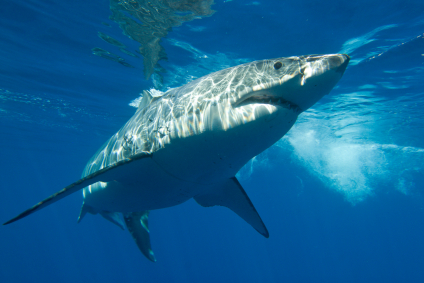 Have you ever surfed a sunset session and happen to be the last person in the water? If you have, it can feel a little sketchy. As it gets darker, not being able to see very far, you start noticing there is no one around. There’s no life guard that will save you if, god forbid, something unimaginable happens. You’re not sure if your mind is playing tricks on your because you just caught a glimpse of something moving. Your imagination starts to run wild and that moving objects resembles a dorsal fin. You see them all the time but you're usually not afraid because they're your friendly neighborhood dolphins. Pausing for a second, you remember that sharks like to feed at night. Within one second of consideration, you're frantically paddling back to shore looking for the next wave to ride to the beach.
Have you ever surfed a sunset session and happen to be the last person in the water? If you have, it can feel a little sketchy. As it gets darker, not being able to see very far, you start noticing there is no one around. There’s no life guard that will save you if, god forbid, something unimaginable happens. You’re not sure if your mind is playing tricks on your because you just caught a glimpse of something moving. Your imagination starts to run wild and that moving objects resembles a dorsal fin. You see them all the time but you're usually not afraid because they're your friendly neighborhood dolphins. Pausing for a second, you remember that sharks like to feed at night. Within one second of consideration, you're frantically paddling back to shore looking for the next wave to ride to the beach.
Encountering a shark is one of the most terrifying experiences any surfer can have and it prevents many people from ever surfing. For the most part, most surfers don't worry too much about shark attacks. It’s common knowledge that the occurrence is so rare, getting struck by lightning is more likely. Dying from a car accident, a dog attack, or an allergic reaction should be more worrisome because, statistically, it is more likely to happen. However, that 1 in a million chance of encountering that deadly predator is enough to deter some people from entering ocean. Non-surfers often refer to sharks as their excuse for not being able to pick up a surfboard for the first time. Perhaps the paranoia of sharks is a great benefit to surf-kind as the crowds could even be worse without it.
According to HowStuffWorks, Professor Jeff Rosenthal from the University of Toronto, says your chances of getting attacked is 1 in 9 million and less than 1 American per year is killed by a shark. In fact, your odds of getting killed by a shark are 1 in 400 million. Over half of all of the world's shark attack takes place on the beaches of Florida. The chances of getting attacked by a shark at a Florida beach are 1 in 430,000 and the odds of getting killed are 1 in 36 million.
Tips To Avoid Shark Attacks
Avoid surfing at night and at dawn
This is popular feeding and hunting time for sharks. Also the lack of visibility from the dark makes it easier for them to mistake you for one of their favorite meals.
Look for warning signs
Warning signs are sometimes posted on beaches where sharks have been sighted. It’s not a good idea to test your fate. Don't ignore the warning signs.
Surf in groups
Sharks tend to attack individuals.
Avoid river mouths and channels
These are areas where food and fish flow out into the ocean making it an abundant resource of sharks to feed. Avoid surfing after it rains because this causes the water to be murky. The low visibility will make it more difficult for sharks to determine whether you're fish or human.
Don't wear anything that is bright, high-contrasting in color, or shiny
Shiny jewelry can resemble the scales of a fish. Bright colors such as yellow and orange and high-contrast attract sharks.
Don't surf if you are bleeding
You can potentially be attracting sharks within a one mile radius. In fact, sharks can smell and taste blood from more than a mile away and they can track that scent back to you. If you get cut, get out of the water. If you're a female who is menstruating, avoid getting into the water.
Stay away from dead animals and fish
Sharks love to feed on dead animals and you don't want to be near when they're feeding.
Stay away from fishing and sewage
Fishermen throw bait into the water which often times can attract sharks. Sewage attracts bait fish which will attract sharks.
Avoid erratic movements and splashing
Playfully splashing around in water can attract sharks. To them, this resembles a prey in distress. Always stay calm in the water because sharks can sense fear.
Beware of drop-offs and sandbars
Often times these are areas that are ideal conditions for surfing but they are favorite feeding areas for sharks.
Get out if there is a shark sighting
Regardless of how epic the waves are, get out of the ocean to surf another day.
What To Do If You Encounter A Shark
Stay Calm and still
This sounds a lot easier said than done but it is really important. Like many predators, shark can sense fear and this will only arouse their senses and attack instincts. You also need to keep cool in order to analyze the few critical seconds that you have to make the right decisions that will save your life. This is not the time to panic. If a shark is approaching, you will not be able to out swim it in open water. Instead, stay still and take the next steps.
Defend yourself
Get in a position where you are able to defend your front and sides of your body. Try to avoid using your hands. Use any weapons possible and in your case it’s likely the only thing you have is your surfboard. If possible, use your board as a shield of a barrier from the shark. Strike back at the shark if you can at its most delicate areas such as their eyes, nose or gills.
Get Aggressive
If it bites into you and drags you underneath water, playing dead will not help. Get as aggressive as you can by clawing at its eyes and gills.
Stop the bleeding
Get out of the water as efficiently as you can. Most sharks who attack surfers think that they're prey. Once they realize that surfers are not their usual high fat meals, they usually let go. In fact, fatal shark attacks are usually due to the injury sustained from the attack and not from getting devoured. It’s critical you get out as quickly as possible and stop the bleeding.
Get help
Find a lifeguard or anyone and get immediate medical attention.
Now that you know the facts and these lifesaving tips, get out there, have some fun surfing, and don’t worry about sharks.

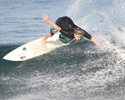
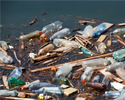



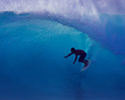

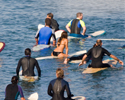
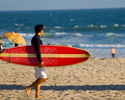
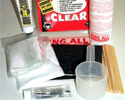




7 Comments